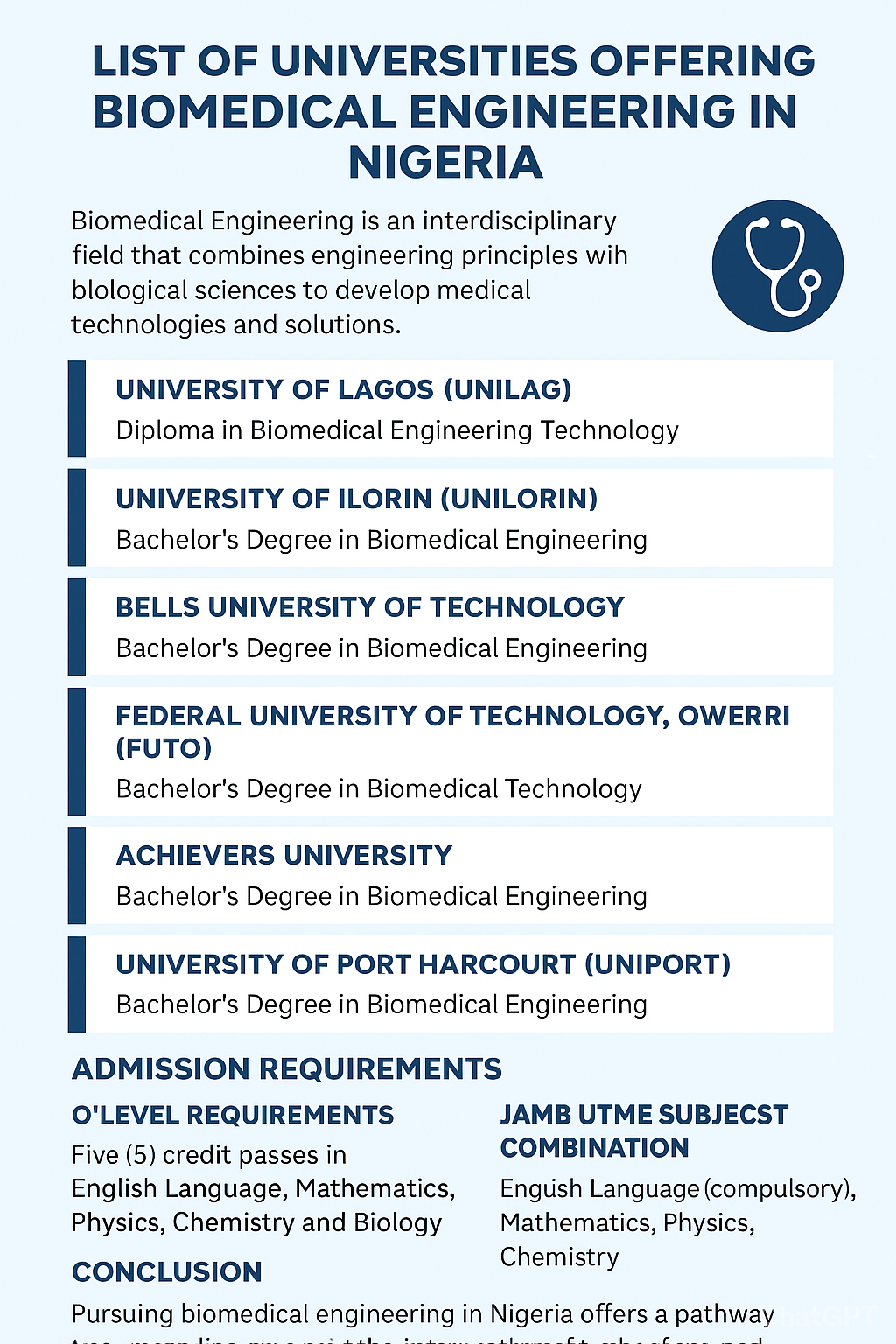Biomedical Engineering is an interdisciplinary field that blends engineering principles with biological sciences to design medical devices, improve healthcare systems, and develop life-saving technologies. As Nigeria expands its healthcare and medical technology sectors, the demand for skilled biomedical engineers is steadily increasing.
If you’re planning to study Biomedical Engineering in Nigeria for the 2025/2026 academic session, this guide highlights universities offering accredited programs, their program types, and the admission requirements you need to meet.
Contents
- Universities Offering Biomedical Engineering in Nigeria
- 1. University of Lagos (UNILAG) – Lagos State
- 2. University of Ilorin (UNILORIN) – Kwara State
- 3. Bells University of Technology – Ota, Ogun State
- 4. Federal University of Technology, Owerri (FUTO) – Imo State
- 5. Achievers University – Owo, Ondo State
- 6. University of Port Harcourt (UNIPORT) – Rivers State
- Admission Requirements
- 1. O’Level Requirements
- 2. JAMB UTME Subject Combination
- Why Study Biomedical Engineering?
Universities Offering Biomedical Engineering in Nigeria
Below is a list of universities currently running Biomedical Engineering or closely related programs.
1. University of Lagos (UNILAG) – Lagos State
Program: Diploma in Biomedical Engineering Technology
Details: Offered through the College of Medicine, this diploma program trains biomedical engineering technicians with hands-on exposure to hospital equipment maintenance and healthcare technology support. It is often a stepping stone into further biomedical or engineering studies.
2. University of Ilorin (UNILORIN) – Kwara State
Program: B.Eng. in Biomedical Engineering
Details: Housed within the Faculty of Engineering and Technology, UNILORIN provides a full undergraduate degree program. The curriculum combines engineering design, medical instrumentation, and applied sciences. UNILORIN is among the few federal universities offering Biomedical Engineering as a standalone bachelor’s degree.
Cut-off Mark: 200 (UTME, subject to annual changes).
3. Bells University of Technology – Ota, Ogun State
Program: B.Eng. in Biomedical Engineering
Details: Known as Nigeria’s first private university of technology, Bells University offers a structured biomedical engineering program that emphasizes innovation in medical devices and healthcare solutions. The program is part of its College of Engineering and Technology.
4. Federal University of Technology, Owerri (FUTO) – Imo State
Program: B.Tech. in Biomedical Technology
Details: Delivered through the School of Health Technology, this program applies engineering principles to biological and medical sciences. While titled Biomedical Technology, its scope overlaps significantly with Biomedical Engineering, focusing on diagnostic equipment and medical devices.
5. Achievers University – Owo, Ondo State
Program: B.Eng. in Biomedical Engineering
Details: A growing private institution, Achievers University runs a biomedical engineering program designed to prepare graduates for careers in hospitals, healthcare equipment companies, and research labs.
6. University of Port Harcourt (UNIPORT) – Rivers State
Program: B.Eng. in Biomedical Engineering
Details: UNIPORT offers Biomedical Engineering through the School of Science Laboratory Technology. The department provides practical training in medical instrumentation and healthcare system development.
Admission Requirements
To gain admission into Biomedical Engineering programs in Nigerian universities, students are expected to meet the following requirements:
1. O’Level Requirements
Candidates must have at least five (5) credit passes in:
- English Language
- Mathematics
- Physics
- Chemistry
- Biology
These must be obtained at not more than two sittings in WAEC, NECO, or equivalent exams.
2. JAMB UTME Subject Combination
- English Language (compulsory)
- Mathematics
- Physics
- Chemistry
Each university sets its own UTME cut-off mark. For example, UNILORIN requires a minimum of 200 for Biomedical Engineering, though this may vary yearly.
Why Study Biomedical Engineering?
Graduates of Biomedical Engineering are equipped to work at the cutting edge of healthcare technology. Career opportunities include:
- Designing and maintaining medical equipment
- Research and development of healthcare technologies
- Employment in hospitals, research institutes, and biomedical companies
- Opportunities for advanced studies in medical robotics, bioinformatics, or clinical engineering
Biomedical Engineering in Nigeria is still a developing field, but several universities are now offering quality programs that prepare students for the healthcare challenges of the future. If you are passionate about combining technology and medicine, consider applying to one of the institutions listed above.
Before applying, ensure you:
- Confirm each university’s accreditation status
- Check the latest admission cut-off marks
- Stay updated on application deadlines for the 2025/2026 session
With the right preparation, pursuing Biomedical Engineering can open doors to a rewarding career that contributes directly to saving lives and improving healthcare systems.



